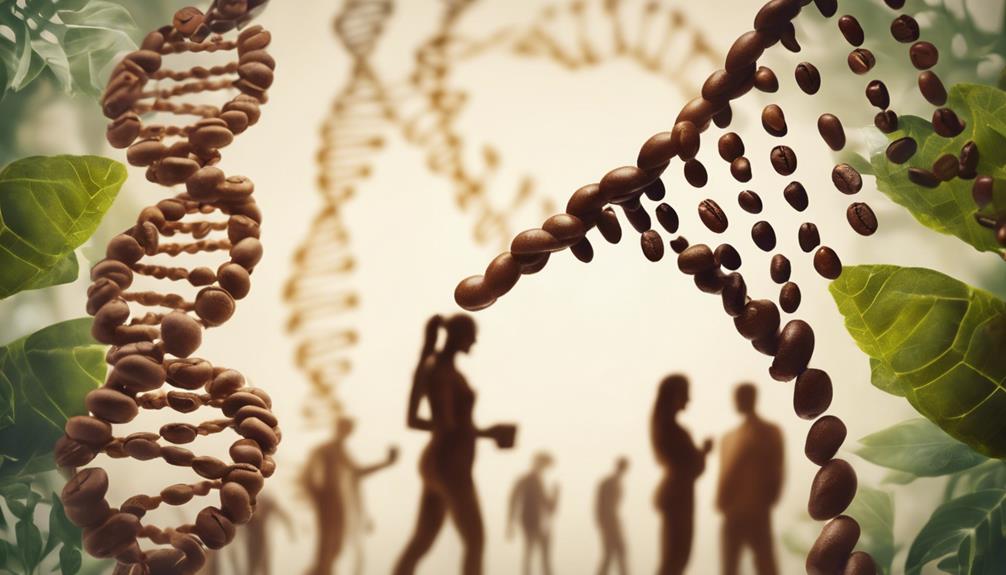No, coffee does not stunt your growth. Scientific studies consistently show there is no link between coffee consumption and decreased height. Genetics and nutrition are the primary factors in determining growth, not your coffee intake. While excessive caffeine can disrupt sleep, which is essential for growth hormone production, moderate consumption is not directly harmful to your height. Proper nutrition, ensuring sufficient calorie intake, and maintaining good sleep patterns are far more important for healthy growth. The belief that coffee stunts growth is a myth rooted in historical misconceptions and lacks scientific backing. By learning more, you will dispel further lingering myths and gain clarity on this topic.
Key Takeaways
- No scientific evidence supports the claim that coffee stunts growth.
- Genetics and nutrition are the primary determinants of height.
- Studies show no significant link between caffeine consumption and decreased height.
- Moderate caffeine intake doesn't impact bone health or growth potential.
- Caffeine can disrupt sleep, indirectly affecting growth hormone production.
Understanding Coffee and Growth
Understanding how coffee interacts with growth can help dispel common myths and misconceptions. When you consider coffee and its caffeine content, it's important to focus on facts rather than hearsay. Despite popular beliefs, there's no scientific evidence to support the claim that coffee stunts growth in children.
It's vital to understand that coffee consumption doesn't directly impact a child's height or overall growth potential. The primary determinants of a child's growth are genetics and nutrition, not coffee. While caffeine, the active component in coffee, can cause short-term effects such as disrupted sleep and moodiness, these effects are temporary and don't affect long-term growth.
Ensuring moderation in caffeine intake is important, especially for children, to avoid these short-term disruptions. However, the notion that coffee can stunt growth is unfounded.
The Coffee and Height Myth

You might've heard that coffee stunts your growth, but there's no scientific evidence to back up this claim. In fact, coffee has been found to have numerous health benefits, including improved cognitive function and decreased risk of certain diseases. It’s also important to note that the sulfite content in coffee is relatively low and should not be a cause for concern. So, if you enjoy a cup of coffee in the morning, you can rest assured that it won’t have any negative effects on your height.
Historical beliefs and advertising campaigns have contributed to this widespread misconception.
Genetics and overall health play a much more significant role in determining height than coffee consumption ever could.
Historical Beliefs Debunked
For decades, people have frequently believed that coffee stunts growth, but this myth has been thoroughly debunked by scientific research. Historically, coffee's reputation for hindering height development arose from unfounded beliefs and misleading advertising campaigns. One such campaign was by Postum, a coffee alternative brand, which suggested that coffee negatively impacted growth, despite lacking scientific evidence.
To understand how these misconceptions spread, consider the following factors:
| Historical Beliefs | Modern Understanding |
|---|---|
| Coffee stunts growth | Debunked by scientific research |
| Misleading advertisements | Lack of evidence-based claims |
| Anti-coffee campaigns | Profit-driven motives |
| Focus on caffeine sources | Regulation of total caffeine intake |
| Inaccurate associations | No link to stunted growth |
These historical beliefs have been debunked over time. Research has consistently shown no direct connection between coffee consumption and stunted growth. Instead, modern scientific consensus emphasizes monitoring overall caffeine intake rather than singling out coffee. The focus has shifted from targeting specific beverages to understanding safe daily caffeine limits.
Scientific Evidence Overview
Scientific research thoroughly debunks the persistent myth that coffee stunts growth. Studies have consistently shown that there's no significant link between caffeine consumption and a decrease in height. The notion that coffee consumption could hinder growth in children lacks scientific support.
Extensive research has explored the effects of caffeine on the human body, particularly in the context of growth and development. Medical advice from credible sources indicates that the primary factors influencing height are genetics and overall nutrition, not coffee intake. The idea that coffee stunts your growth likely originates from historical misconceptions and anecdotal evidence rather than empirical data.
Modern scientific studies and regulations emphasize that there's no evidence to suggest coffee has any impact on height. For instance, researchers have found no connection between moderate caffeine consumption and bone health, a critical factor in growth. As a result, the belief that coffee might stunt growth remains unsubstantiated by current scientific knowledge.
Nutritional Factors Explained
When considering the factors that truly influence height, genetics and nutrition far outweigh any impact from coffee consumption. Your height is primarily determined by your genetic makeup, which dictates the potential range of your growth. However, proper nutrition is essential for you to reach this potential. Nutrients such as calcium, vitamin D, and protein are vital for bone health and growth, directly affecting your height.
Coffee itself doesn't contain any substances that would inhibit your growth. The myth that coffee stunts growth isn't supported by scientific evidence. Instead, factors like calorie intake and nutrient deficiencies play a more significant role in determining your height. Poor nutrition, especially during the critical growth periods of childhood and adolescence, can lead to stunted growth and other health issues.
While coffee might indirectly affect growth by disrupting sleep or contributing to nutrient deficiencies if consumed excessively, it isn't a direct cause of reduced height. Conditions such as osteoporosis and spinal disorders are more commonly associated with height loss in adulthood.
Therefore, focusing on maintaining a balanced diet rich in essential nutrients is far more important for achieving the best growth and height.
Caffeine's Impact on Sleep

Consuming caffeine close to bedtime disrupts your sleep patterns and can severely affect the quality of your rest. When you ingest caffeine, it acts as a stimulant, making it harder for your body to relax and fall asleep. This disruption can lead to sleep interruptions, preventing you from achieving the deep, restorative sleep necessary for best health. Poor sleep quality can hinder the production of growth hormones, which are vital during developmental stages, especially in children.
Lack of adequate sleep due to caffeine intake can result in mood changes, irritability, and reduced cognitive function. These effects don't just impact your daily activities; they can also affect your overall well-being and long-term growth. Consistent sleep interruptions from caffeine consumption may lead to growth issues by affecting your body's ability to rest and regenerate properly.
To promote healthy growth and development, it's important to manage caffeine intake, particularly for children and adolescents. Ensuring adequate and uninterrupted sleep supports not only physical growth but also emotional and cognitive development.
Calcium and Bone Health

Maintaining sufficient calcium intake is essential for keeping your bones healthy and preventing osteoporosis. Coffee consumption, while enjoyed by many, can lead to increased calcium excretion, potentially impacting your bone health. However, this doesn't mean you need to cut out coffee entirely. Instead, it's about finding a balance to guarantee your bones stay strong.
Here are some key points to ponder for maintaining peak bone health:
- Adequate Calcium Intake: Aim for a diet rich in calcium to support bone density.
- Moderate Coffee Consumption: Limit your coffee intake to avoid excessive calcium loss.
- Vitamin D: Make sure you get enough vitamin D, which aids in calcium absorption.
- Balanced Diet: Include a variety of calcium-rich foods, such as dairy products, leafy greens, and fortified foods.
- Bone Health Monitoring: Regular check-ups can help track your bone density and overall health.
It's vital to understand that while coffee consumption can affect calcium levels, moderate intake combined with a balanced diet and adequate vitamin D can help maintain strong bones. By managing these factors, you can enjoy your coffee without compromising your bone health.
Role of Genetics in Growth

Genetics greatly influence your height, determining much of your growth potential based on family traits. The height of your biological parents is a significant indicator of your eventual stature, but it doesn't stop there. The heights of your grandparents, aunts, and uncles also play a role, underscoring the significant impact genetics have on growth.
However, it's not solely about inherited traits. Despite your genetic blueprint, other factors can intervene. Growth disorders and hormone deficiencies can disrupt expected growth patterns, making it essential to monitor your development closely. These conditions can prevent you from reaching your genetically predetermined height, highlighting the complex interplay between genetics and health.
Annual wellness visits are important in this scenario. During these check-ups, healthcare providers can track your growth and promptly identify any deviations from expected patterns. Early detection of growth disorders or hormone deficiencies allows for timely interventions, ensuring you have the best opportunity to achieve your full growth potential.
Understanding the role of genetics in growth helps clarify why some individuals may not grow as anticipated, despite a family history of tallness, emphasizing the importance of thorough health monitoring.
Importance of Nutrition

While genetics set the stage for your growth potential, nutrition plays a pivotal role in realizing that potential. Proper nutrition ensures that your body receives the essential nutrients required for healthy development. A balanced diet rich in carbohydrates, protein, and healthy fats provides the necessary building blocks for growth.
Inadequate nutrition can lead to stunted growth, particularly in children who are more susceptible to caloric deficits and nutrient deficiencies.
To promote healthy development, consider the following key nutritional aspects:
- Carbohydrates: Essential for energy, they fuel the body's growth processes.
- Proteins: Critical for cell growth and repair, aiding in muscle development.
- Healthy Fats: Important for brain development and hormone production.
- Vitamins and Micronutrients: Necessary for various bodily functions, including tissue development.
- Caloric Intake: Ensuring sufficient calories to meet growth demands is crucial, especially in households at risk of poverty.
Incorporating these elements into your diet can have a significant impact on your overall growth trajectory. While genetics determine your growth potential, lifestyle factors like nutrition are indispensable in achieving that potential.
Therefore, maintaining a balanced diet is essential for preventing stunted growth and fostering optimal development.
Lifestyle Factors Affecting Growth

Your lifestyle choices can greatly impact your growth and development. While genetics play a vital role in determining your height, lifestyle factors can influence your full growth potential. Poor nutrition, for instance, can stunt growth, especially in childhood. A balanced diet rich in carbohydrates, protein, and healthy fats is essential for healthy growth. Vitamin or micronutrient deficiencies can also hinder cell growth and tissue development, so ensuring a well-rounded diet is paramount.
Calorie deficits, often due to poverty, can notably affect childhood growth. Inadequate food intake can cause malnutrition, leading to stunted growth. Additionally, growth disorders and hormone deficiencies need proper monitoring and intervention to prevent long-term effects on growth.
Here's a quick overview:
| Factor | Impact on Growth | Solution |
|---|---|---|
| Poor Nutrition | Stunts growth | Balanced diet with essential nutrients |
| Calorie Deficits | Hinders development | Ensure adequate food intake |
| Vitamin Deficiencies | Affects cell growth | Include diverse, nutrient-rich foods |
Caffeine, often blamed for stunted growth, doesn't directly cause growth issues. However, excessive caffeine intake can affect sleep and nutrient absorption, indirectly impacting potential health and childhood growth. Monitoring lifestyle choices ensures you maximize your growth potential.
Safe Coffee Consumption for Kids

To sum up, when contemplating coffee for kids, it's important to understand the potential health risks involved. Pediatric endocrinologist Roy Kim emphasizes that caffeine intake in kids should be approached with caution. The American Academy of Pediatrics doesn't recommend any safe amount of caffeine for children due to the multitude of adverse effects it can cause.
Here are some key points to take into account:
- Abnormal heart rhythms: Excessive caffeine can lead to irregular heartbeats, posing significant health risks.
- Anxiety: High caffeine intake may increase anxiety levels in children, affecting their overall well-being.
- Disrupted sleep: Caffeine can interfere with sleep patterns, leading to long-term sleep issues.
- Increased body weight: Caffeinated drinks like soda and energy drinks can contribute to weight gain and obesity.
- Moodiness and restlessness: Even moderate caffeine consumption can make kids moody and restless, impacting their daily activities and interactions.
Evaluations for issues such as sleep and attention problems in children often include considering their caffeine consumption. The potential for mood disturbances, restlessness, seizures, and upset stomach further underscores the importance of limiting caffeine.
Health Benefits of Coffee

Coffee isn't just a morning pick-me-up; it's packed with health benefits that can positively impact your well-being. For starters, coffee contains beneficial phenolic acids with antioxidant properties, which help combat oxidative stress in your body.
Regular coffee consumption has been linked to a reduced risk of developing neurodegenerative diseases like Parkinson's and Alzheimer's. These health benefits are attributed to the caffeine and other compounds in coffee that support brain health and cognitive function.
Additionally, caffeine enhances alertness and focus, making it easier for you to tackle daily tasks effectively. It's also been shown to improve physical performance, which can be particularly beneficial during workouts.
Moreover, studies have found that moderate coffee consumption is associated with a lower risk of certain cancers and heart disease, adding to its list of potential health benefits.
Interestingly, drinking coffee has been linked to a reduced risk of depression, offering a mental health boost that shouldn't be overlooked. While concerns about coffee and growth persist, these health benefits highlight the positive aspects of moderate coffee consumption.
It's essential to balance your intake to reap these advantages without overindulging.
Risks of Excessive Caffeine

While coffee offers many health benefits, excessive caffeine intake can pose significant risks, especially for children. The American Academy of Pediatrics emphasizes the importance of limiting caffeine intake in kids. Excessive caffeine can lead to a number of health issues that are particularly concerning for younger individuals.
- Anxiety: High caffeine levels can increase anxiety and jitteriness.
- Irritability: Children who consume too much caffeine can become irritable and restless.
- Headaches: Caffeine can trigger headaches, especially in those who are sensitive to it.
- Upset stomach: Excessive caffeine can cause gastrointestinal discomfort and upset stomach.
- Sleep disturbances: Consuming caffeine, particularly before bed, can interfere with sleep patterns.
There is no proven safe dose of caffeine for children, making it essential to monitor and control their intake. Research on caffeine's effects in kids is limited, but the existing data suggests that children experience similar caffeine-related health issues as adults.
Cultural norms in some regions may promote coffee consumption in childhood, but moderation is vital. Parents and caregivers should be vigilant in limiting intake to prevent these potential risks. By being proactive and informed, you can protect your child's health and well-being.
Frequently Asked Questions
Does Coffee Affect a Child's Growth?
Caffeine can affect a child's overall health rather than directly stunting growth. Children consuming caffeine might experience abnormal heart rhythms, anxiety, sleep disruptions, and high blood pressure.
Additionally, caffeinated drinks can contribute to obesity and other health issues. The American Academy of Pediatrics doesn't recommend caffeine for children, as it can lead to various negative effects like moodiness, restlessness, and headaches, but there's no direct link to growth stunting.
What Can Stunt Your Growth?
As the saying goes, 'You are what you eat.' Factors that can stunt your growth include genetics, calorie deficits, and poor nutrition. A lack of essential vitamins and micronutrients hinders cell growth and tissue development.
Additionally, growth disorders, hormone deficiencies, and various medical conditions can affect growth. Ensuring a balanced diet rich in carbohydrates, proteins, and healthy fats is crucial for healthy development.
Can a 13 Year Old Drink Coffee?
A 13-year-old can drink coffee, but it's important to monitor their caffeine intake.
The American Academy of Pediatrics suggests that children aged 12 and under avoid caffeine, while 13-year-olds should limit their intake to 100 mg daily.
Since a typical cup of coffee contains 70-140 mg of caffeine, portion control is vital.
Consider individual tolerance, diet, and potential sensitivities before allowing a 13-year-old to drink coffee.
Is Coffee Bad for Kids?
Imagine caffeine as a double-edged sword; for kids, it can cut deep into their health. Coffee is bad for kids as it can lead to abnormal heart rhythms, anxiety, and disrupted sleep. The American Academy of Pediatrics states no amount of caffeine is safe for them.
Additionally, it can contribute to obesity, moodiness, and attention problems. Hence, it's imperative to keep kids away from coffee and other caffeinated beverages.
Conclusion
So, you might've heard that coffee stunts your growth, but that's just a tall tale.
While caffeine can affect your sleep and too much of it mightn't be great for your bones, coffee itself isn't the culprit behind any height issues.
Genetics and overall lifestyle play a much bigger role in how tall you'll grow.
So, enjoy your cup of joe in moderation, and rest assured it won't shrink your stature.









